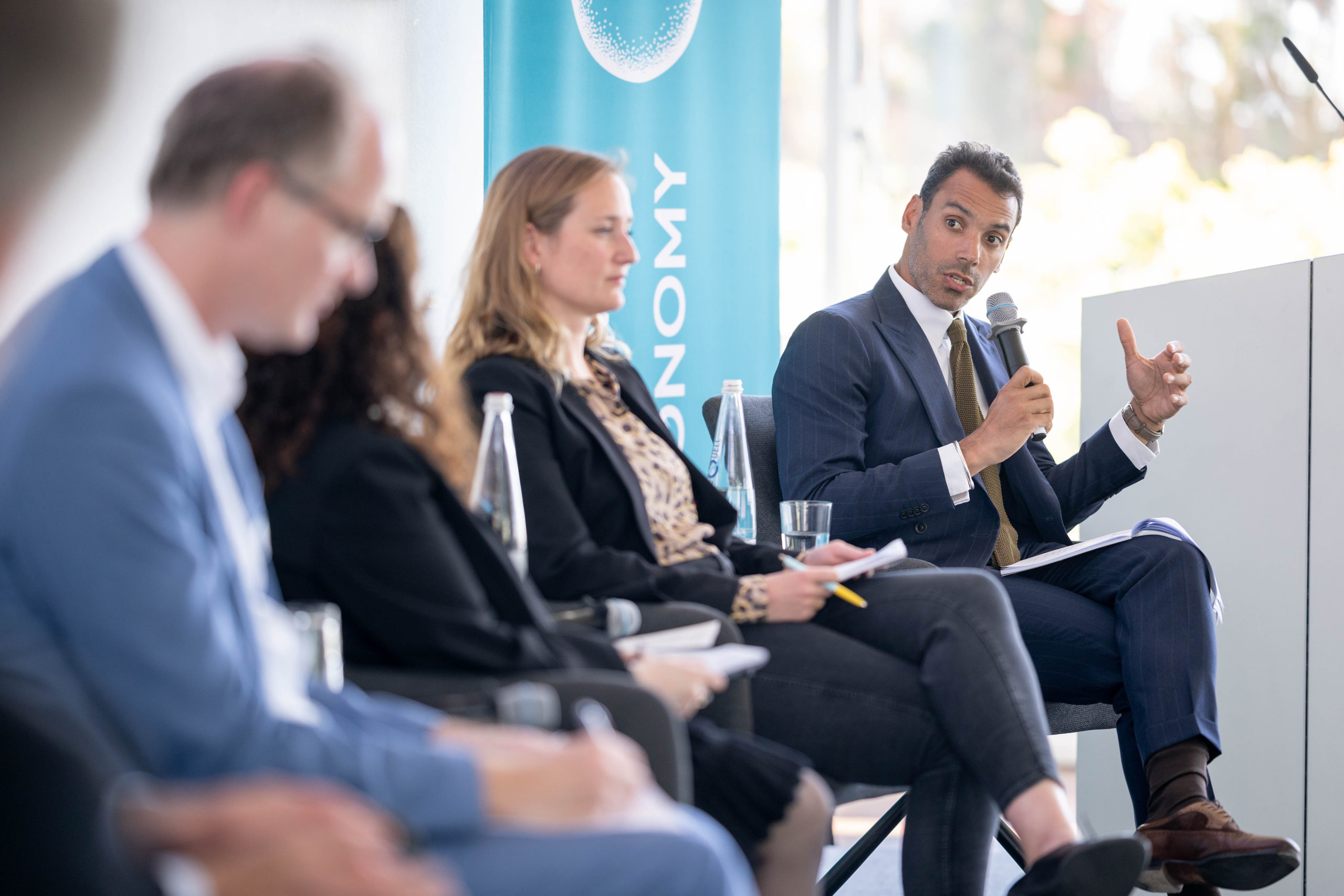GLOBALIZATION
Redefining the German Export Model
On the question of better managed globalisation in times of geopolitical risks, Shahin Vallée (DGAP) presented a draft paper commissioned by the Forum in which he analyses possible derisking instruments for the German economy. He discussed his preliminary findings with Katrin Kamin (IfW), Dalia Marin (TUM), Klaus Deutsch (BDI), and Sebastian Dullien (IMK) at the XII New Paradigm Workshop on 8 May 2023.
BY
MAREN BUCHHOLTZPUBLISHED
12. MAY 2023READING TIME
5 MIN
Since the start of the Russian war of aggression against Ukraine, the traditional and geo-politically naïve German economic model of export-led growth has come under intense scrutiny. In a paper commissioned by the Forum, Shahin Vallée (DGAP) and his co-authors Sander Tordoir (CER) and Sebastian de Quant (DGAP) analyse potential de-risking policy instruments for Germany. The key to that is an accurate identification of German vulnerabilities to China and a clear definition of risks by sector.
At the outset of this presentation, Vallée highlighted that most of Germany’s top companies remain highly dependent on exports to China. If the trend of skyrocketing vehicle production in China continues, German car manufacturers might soon see their export numbers drop. In the area of e-mobility, China has become an export powerhouse in recent years and is predicted to become the dominant exporter of electric vehicles. Expanding low-carbon technologies could therefore be a crucial tool for diversifying the German economy.
Beyond Germany’s high export dependence, Vallée stressed that recent developments in capital flows are even more cause for concern. What is more, there seems to be a lack of coherence with regard to inbound investment in critical European infrastructure, as shown by the most recent decisions about the port of Hamburg vis-à-vis Rotterdam and Piraeus. Thus, European cooperation in defining a de-risking strategy will be crucial in the years to come. In Valleé’s view, recent policy discussions around an industrial price cap in Germany beg the question of whether other European countries will be fiscally able to follow such a strategy, and whether more European solidarity would be required.
“Derisking will imply far-reaching allocative and redistributive consequences in Europe.”
The panelists Katrin Kamin (Kiel Institute for the World Economy, IfW), Dalia Marin (Technical University of Munich), Klaus Deutsch (Federation of German Industries, BDI), Sebastian Dullien (Macroeconomic Policy Institute, IMK) agreed on the difficulty of identifying the relevant risk factors. Katrin Kamin (IfW) explained that better data (“supply chain intelligence”) is needed above all for an effective de-risking strategy. Obtaining sufficient data on inputs and outputs along the entire supply chain is however not a trivial task, as she pointed out:
“I really see that a lot of companies themselves don't know their whole supply chains. And that's a huge problem because we cannot really assess all vulnerabilities that we don't have that information.”
So how can Germany, in particular the automotive sector, avoid a ‘China shock’?
Dalia Marin (TU Munich) argued that Germany should reverse engineer China’s industrial policy and US-American innovation policy. For instance, Germany should focus on attracting FDI by Chinese battery firms, Asian semiconductor firms, and Israeli AI firms in joint ventures, according to Marin. With the US example of DARPA in mind, she envisioned that a deeper European military cooperation could eventually lead to more (technological) innovation.
Sebastian Dullien (IMK) stressed that a comprehensive assessment of geopolitical risk is not an easy task, as political circumstances, including in the US, can change quickly. Moreover, the economic damage caused by supply chain disruptions is difficult to quantify, as the recent example of semiconductor shortages has shown. Dullien therefore advocated that companies should conduct supply chain stress tests.
Commenting on this particular suggestion, Klaus Günther Deutsch (BDI) expressed the notion that managing supply chain risk should first and foremost fall on the responsibility of companies, their supervisor boards, and financial markets. He acknowledged that markets are not currently pricing in geopolitical risk through companies’ equity valuations and credit conditions.
During the discussion, Vallée also underlined that a definition of derisking should include not only scrutinizing trade relations with China but also with countries that are themselves completely dependent on China as well as autocratic states and those currently experiencing an erosion of democracy. According to Vallée, a new German policy framework for de-risking should be embedded within a European strategy, which might not completely align with the US strategic ‘containment’ of China, and should aim at building a multipolar world.

